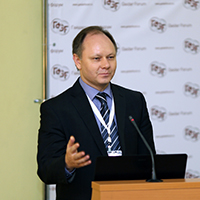
Sergey Paltsev, assistant director for economic research at the MIT Joint Program on the Science and Policy of Global Change, presented at the 2014 Gaidar Forum entitled "Russia and the World: Sustainable Development."
The expert discussion “Green growth” and sustainable development” was dedicated to such topics as energy efficiency and renewable energy as the drivers of economic growthas economic growth drivers. Besides it focused on the perspectives of “the third industrial revolution”, which is not a new idea, however it opens the prospects for efficient energy use.
Oleg Lugovoy, Research Advisor, Center for Economic Modeling of Energy and Environment, RANEPA, Jeffrey Sachs, Director of the Earth Institute and Professor of Columbia University, Hillard Huntington, Executive Director of Energy Modeling Forum, Stanford University, Emmanuel Guérin, Associate Director of Sustainable Development Solutions Network (SDSN), Frederic Vidal, President of Université de Nice Sophia-Antipolis, Sergey Paltsev, Assistant Director for Economic Research of MIT Joint Program on the Science and Policy of Global Change of the Massachusetts Institute of Technology, John Laitner, Resource Economist and Independent Consultant of Economic and Human Dimensions Research Associates and Glen Peters, Senior Research Fellow of the Center for International Climate and Environmental Research of Norway, took part in the discussion.
In his opening remarks, the moderator Oleg Lugovoy defined the vector of the discussion: “It’s a discussion on how to achieve high growth rates and improve life quality without causing harm to the environment.” He also noted that the problem could not be solved by the efforts of business and public organizations alone, but depends on economic regulation.
John Laitner turned the participants’ attention to the task of increasing the quality of energy efficiency giving USA as an example, where 86% of all energy is spent to no purpose. Inefficient use of energy leads to huge costs and is a factor limiting, in Russia as well, the potential for economic development. The expert underlined that the idea of the third industrial revolution which consists of combination of interactive communications and new green technologies is getting more important.
Jeffrey Sachs reminded the participants of the discussion about the idea of a prominent Russian economist Nikolai Kondratyev on periodic economic cycles (waves) linking it to the concept of a shift in technological modes. Each of them had limited resources, but never before has the scale of economic activity been so impressive and the number of population so huge (7.2 billion people). “90 trillion dollars – this is the volume of the annual economic output,” Jeffrey Sachs noted, “and this figure tends to grow progressively. So do the CO2 emissions as well. Already today 38 billion tons of СО2 are annually emitted into the Earth’s atmosphere,” the expert noted.
However, changing the energy system profoundly and substantially over 40-50 years is quite a challenge. One of the possible solutions is to switch to alternative types of fuel or renewable energy sources. Nuclear energy, if it is safe, also has a high potential. But the most important thing, according to the expert, is to reduce coal consumption, in particular, “convince China, the country which consumes this fuel in huge volumes, to do so.”
The report by Hillard Huntington marked a turn in the discussion to the subject of shale gas. The expert noted numerous uncertainties pertaining to shale gas extraction. It is still difficult to evaluate the outlook for price policy in this field unambiguously, which is caused not only by the way it is extracted, but also the volumes of gas supply.
Sergey Paltsev agreed with his colleague. He immediately dotted the i’s noting the “platitude” of shale gas: “It does not differ from the common methane, the difference lies in the method of extraction which consists in subsurface fracture.” Answering the question “whether Gazprom has overslept shale gas revolution or not”, the expert agreed with the estimation given by the Prime Minister of the Russian Federation Dmitry Medvedev who said that “this question is quite complicated.” “Gazprom has enough gas and it can go without shale gas, given proper investment and price policy,” Mr. Paltsev summarized. He also noted that the consequences of fraction are difficult to predict. Besides, the use of huge amount of water during extraction makes its benefits ambiguous, at the same time CO2 emissions from the use of natural gas are far from zero, therefore it is impossible to say that its production can address the problem of emissions globally.

